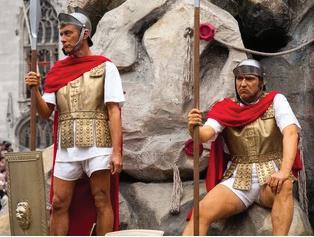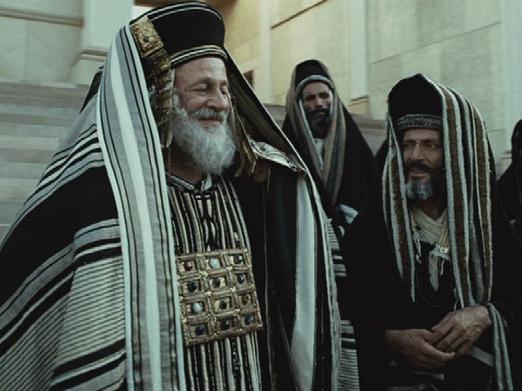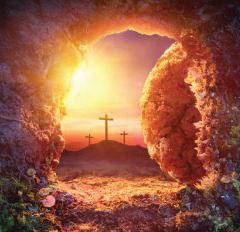
7 minute read
WHAT CHANGED THE CROSS?
“And sitting down they watched Him there” (Matthew 27:36 KJV). “Na noho ana ratou ki te tiaki i a ia i reira” (Matiu 27:36). One of the most common symbols we see today is the cross. On almost every church spire one can be seen. People wear them as ornaments around their necks or dangling from their ears, and they are commonplace on many tombstones. But do we really understand the significance of the cross?
Until a certain point in history the cross was nothing more than a terrible instrument of human torture and indescribable suffering. Crucifixion was a common means of execution, especially among the Romans, and thousands of people died this way. It was a cruel and horrible death. But there came a time when the significance of the cross changed, and instead of being an emblem of suffering, torture and death, it came to be seen as one of hope and virtue. What caused such a radical change? The reason for such a change is seen in our verse above. Let’s take time to think about it. There are three words in this short verse we need to carefully consider. 1. “THEY”: Who were “they” – these people who were prepared to sit down and watch the hideous death throes of a fellow human being? None of them understood the tremendous significance of the scene they were watching. They knew nothing of the truth of “Jesus Christ and Him crucified” (1 Corinthians 2:2). The military are the first to be referred to – the soldiers who were responsible for carrying out the executions that day. There had been three of them, but the Prisoner on the centre cross was so entirely different from every other prisoner they had handled. These soldiers had previously surrounded Him in the governor’s residence to mock Him, during which they had twisted a branch of the long-thorned briar into a grotesque crown and cruelly pushed it down on His head. But these hardened soldiers would never forget His words, as with careless blows they drove the jagged spikes through His hands and feet – “Father, forgive them, for they do not know what they are doing!” Nevertheless they had completed their gruesome task and now they were sitting down to guard the scene and see the end result.
Advertisement
The religious people were also there – the scribes and Pharisees, the hypocrites, leaders of the Jewish nation. (Most likely the unbelievers were standing alongside them). They too had done their work.
For some time they had clamoured for 18
the death of the One on the centre cross. Time and again He had castigated them for their blatant hypocrisy. Finally they had arrested Him and cunningly manipulated the Roman governor into passing the death sentence. It had been difficult, for the governor had pronounced Him innocent on three occasions and they were galled by the fact that they could not pass sentence themselves, being under Roman rule at the time. But they had eventually pulled it off and now they exulted in what they supposed was their ultimate victory. The common people were there – many being caught up in the excitement and intensity of the occasion. Some were confused: They had received loaves and fishes from His hand, and they could not understand why He must die. A mother with a little child kept asking, “Why are they putting Him to death? He brought my child back to life. What harm could there be in that?” Others had been blind and lame, and some had been outcasts because of leprosy, but all had received His healing touch. Now they wept in their despair as they watched in stunned horror the ugly scene unfolding before them. You and I were there too. Not physically, but we were all represented on Calvary that day. It was our sins that put Him there, and pardon for them all is freely available in His blood that was shed. The great truth that shines down through the ages from that “old rugged cross” is that Jesus died for YOU and ME. All our sins were laid upon Him. There is no sin too big for God to forgive. The next word for us to consider is – 2. “HIM”: The reason the meaning of the cross changed so much was because of the One who died upon it that day, and the purpose for which He died. He was not just another good man, nor just an innocent man. Hundreds of good people have been crucified and died as martyrs, but their deaths never changed the cross. Jesus Christ was who He claimed to be – the Son of God. The Bible tells us that “In the beginning was the Word, and the Word was with God (for He was with God the Father and God the Holy Spirit), and the Word was God!” (John’s Gospel 1:1). This means that by nature of being, Jesus Christ is God! By nature of being we are human, but by nature of being He is God (Deity), one of the members of the Godhead (the Trinity). No mere human being could ever change so radically the meaning of the cross, however virtuous he may be.


Indeed His resurrection was a miracle, and is necessary for the validity of the Christian faith. But do we ever stop to think about the miracle of His death? The One who is the very author of life itself, the One who is the Agent of creation – submitted Himself to death, and that the death of the cross! He commands the hosts of Heaven and could have called upon more than twelve thousand angels to deliver Him. Any one of them could have swept that whole scene into oblivion in seconds, but Jesus did not do that because He had voluntarily chosen to go to the cross. He, the Word of God became flesh (human), in order that He might become the Lamb of God as the perfect sacrifice for our sins (John’s Gospel, chapter 1 verses 14 and 29).
The third word is –3. “THERE”: This word brings before us the reason for which Jesus was on the cross. It was the place of death, and because of our sins it was really our place. The Bible says that “the wages of sin is death . . .” (Romans 6:23). This refers not just to physical death, but spiritual death which means separation from God forever in Hell. Jesus took our place in death; He died in our place so that we could be forgiven, cleansed from every sin we have ever committed, and have eternal life. The Bible further says in the same verse, “But the gift of God is eternal life through Jesus Christ our Lord”.
There were two thieves crucified with Jesus that day. Both of them deserved to die for their crimes. One of them hurled insults at Jesus, “If you are the Son of God, save Yourself – and us!” He sought salvation from the terrible suffering of his execution, not salvation from his sin. But the other thief recognised Jesus as the sinless Son of God and received Him as his Saviour there on the cross. He said to Jesus, “Lord, remember me when You come into Your Kingdom.” In response, Jesus answered him, “I tell you the truth, today you will be with Me in Paradise”. Pontius Pilate, the Roman governor who passed sentence on Jesus, asked a question of the religious leaders that day. When, to his dismay, they chose a notable criminal called Barabbas be released to them instead of Jesus, he asked, “What then shall I do with Jesus who is called Christ?”
From that great Praetorium – that infamous hall of Roman judgment – the same question has been presented to men and women, boys and girls, down through the years to this present day. And now it comes to you: “What will you
do with Jesus who is called Christ?”
Think about it carefully, for what you do with Jesus will determine what God will do with you in a coming day. Eternity is forever! We will spend it in one of two places – Heaven, if we receive Jesus as our Lord and Saviour; Hell if we reject Him. – Editor.










